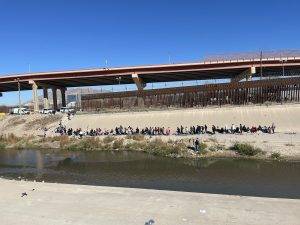By Emily Sollie
Lenny stands next to the bank of the Rio Grande/Rio Bravo. He can see the U.S. from where he stands in Ciudad Juárez, Mexico, but he can’t get there. As a Venezuelan, he is not allowed to enter the country due to the controversial Title 42 policy, an emergency public-health measure enacted during the pandemic that was later expanded to include Venezuelans. A former soldier in the Venezuelan armed forces, he decided to leave his home country looking for greater opportunities. Now he squeaks by with odd jobs – unable to finish his journey to America, unable to go home, and uncertain what the future holds. A federal district court in Washington D.C. recently vacated the Title 42 order for violating U.S. law; it was scheduled to end on December 21, pending an appeal to the U.S. Supreme Court. A decision is imminent, which could mean more delays.

Photo credit: Emily Sollie
Just across the river in El Paso, Maria, from El Salvador, sits on the sofa in a respite shelter for migrants. She rubs her pregnant belly as she gazes at the Christmas tree the shelter staff and guests have decorated, an attempt at fostering holiday cheer. “May I pray for you?” asks Rev. Rose Mary Sánchez-Guzmán, pastor of Iglesia Luterana Cristo Rey in El Paso. They are at 30-bed short-term shelter for migrant families. Her congregation serves migrants on the weekdays. The young woman nods, and the pastor puts a hand on her shoulder and whispers a prayer in Spanish.
I met Lenny and Maria on a visit to El Paso and Ciudad Juarez earlier this month with AMMPARO colleagues. We were there just days before a high number of asylum-seekers began crossing the Mexico-US border, many aiming to turn themselves in to border officials on the other side. This has made national headlines. Their arrival has created a humanitarian emergency within the city, as officials scramble to accommodate thousands more people than city shelters have capacity to house.
Now, back in my comfortable home in Washington D.C. and preparing for Christmas with my family, I find myself thinking of them and the thousands of others like them, for whom this season is perhaps less joyful, filled with uncertainty for the future. I think of the words Pastor Rose Mary preached, the morning before she prayed with Maria:
“We need to be guided with God’s wisdom and love so we can give hope to the world … we are His instruments here on Earth. I am thankful to God for this church – for giving hospitality to the stranger.”
The pastor’s eyes teared up as she recalled a tragedy in her own family.
“If you just focus on your own problems,” she said, “you will drown. I know. I’ve been there. But when you focus on praising God and helping others, your soul starts to heal.”
We are called to welcome the stranger. We are called to give hospitality to refugees and immigrants. We are called to see the face of God in the faces of our brothers and sisters in need.
As I prepare for the festivities with my family, I reflect on this calling and I also pray. I pray for migrants and refugees and all those seeking safety, shelter, and opportunity. I pray for Pastor Rose Mary and Cristo Rey, and all who welcome the stranger. I pray for our elected and appointed officials, who make policy decisions that affect the lives of millions.
I pray for Maria – that her child, like one born in a manger long ago and far away, will be delivered safely, will be healthy, and will have a warm place to call home.
Emily Sollie is an Interpretation Associate for the ELCA. She accompanied the ELCA AMMPARO staff on a week-long trip to U.S.-Mexico Border that included visits to multiple ELCA synods and congregations accompanying migrants, like Iglesia Luterana Cristo Rey. The names of the two individuals in this reflection have been altered to protect their identity.
You can support AMMPARO, working with our companion churches and partners, to accompany migrant families and individuals by donating to the ELCA and dedicating your gift to “AMMPARO.” You can access that form here.

